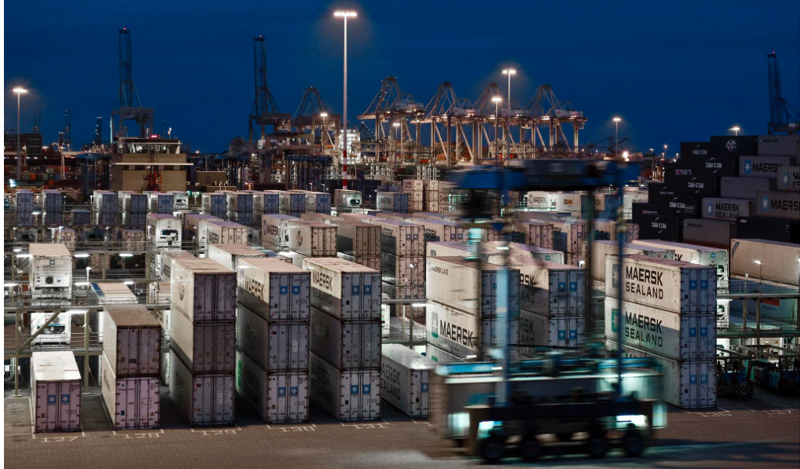In case you needed yet another sign of how e-commerce is transforming traditional global logistics, 140-year-old ocean container giant Moller-Maersk is evolving, set to grow the proverbial legs that will let it walk out of the seas and deliver on land to consumers’ doorsteps.
The company — ancient in today’s world of Amazons and Alibabas — recently announced its intention to expand its inland transportation capabilities, putting it in the same competitive ecosystem as UPS and FedEx, allowing customers to interact with only one company when shipping goods across the globe.
Maersk’s expansion would enable it to label parcel shipments in Hong Kong with residential destinations in the U.S., use its ocean containers to transport to the port, and then either complete final-mile delivery itself, or drop-ship loads into regional carrier or USPS facilities for delivery — potentially competing with UPS TradeDirect services.
Survival is a good motivator
The motivation for the change is simple: e-commerce demand is causing a restructuring to reduce steps in the supply chain to get goods to end users faster. Ocean container companies and freight forwarders will have to change the way they do business to survive, detaching themselves from traditional global supply chain patterns: shipment loaded on an ocean container, lands at port, processed through customs by a freight forwarder, transported to a warehouse, cross docked, sent to another warehouse for inventory entry, repackaged, and then finally sent to stores.
And if they don’t change the way they do business, then Amazon will. Or, as Moller-Maersk CEO Soren Skou explained in an interview with Bloomberg, “Amazon is a threat if we don’t do a good job for them. If we don’t do our job well, then there’s no doubt that big, strong companies like Amazon will look into whether they can do better themselves.”
Amazon’s growing appetite
Amazon is already showing its appetite for expansion into the logistics market with a new service dubbed Shipping With Amazon (SWA) that would put it into direct competition with shipping giants FedEx and UPS. Currently, Maersk and similar companies handle shipments destined for Amazon warehouses, but, as the Bloomberg piece notes, Amazon could take control of its shipments giving it more flexibility and relieving congestion by purchasing or buying into a smaller global box shipping line — and we all know how Amazon likes buying stuff, so it’s not out of the realm of possibility.
Maersk needs to get ahead of that possibility — fast. The company set an ambitious timeline of 3 to 5 years to make the transition, signaling perhaps its commitment to the strategy, but also the pressure to adapt to an ever-changing industry that’s seeing new, agile players threatening to eat portions of its business, eventually leaving global beasts like Maersk starving.
Safety in digital partnerships
It’s not going to be easy, either. In fact, some experts are skeptical that the company will be able to break from its core competency — ocean liner shipping. Right now, the company’s network extends, at best, to large port cities around the world. It will take partnerships with logistics providers with local delivery networks and warehousing to compete on such a scale.
It’s also going to take technology and business integration. In January, Maersk announced a partnership with IBM to use blockchain technology, artificial intelligence, and IoT and analytics to manage and track cross-border trade, “addressing the need to provide more transparency and simplicity in the movement of goods across borders and trading zones,” the company explained. The “global trade digitization platform will be built on open standards and designed for use by the entire global shipping ecosystem.”
It’s a smart, necessary move, one that will help it survive the aftermath of the e-commerce meteor that isn’t done changing the logistics landscape. If Maersk can successfully develop those digital legs, and build a simplified, transparent supply chain, it will be able to run with technology-driven customers like Amazon, minimizing the risk of losing business or being trampled by competition.
Welcome to the e-volution, where only the strategic and technologically savvy will survive.
